for the restaurant.
(excluding Sundays, and national holidays)
Formal seats
- * All prices include tax.
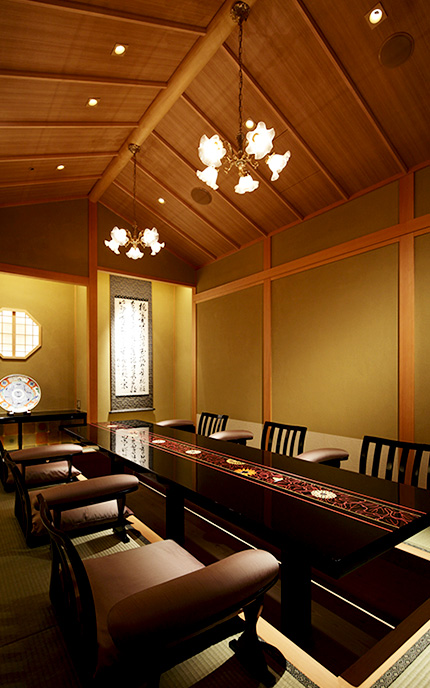
Cho-u Room
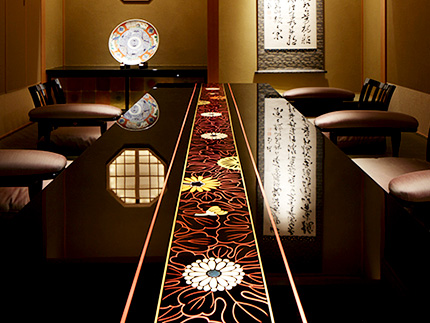
Lacquered table
Cho-u Room
This private room imitates the Imperial Room on the highest floor of Shimonoseki Shunpanro, where the Emperor and Empress Showa stayed. The room has a boat-shaped ceiling and a lacquer-coated table and is equipped with a bathroom inside.
Shunpanro Tokyo is located in Hirakawa-cho, Chiyoda-ku, on the site of the residence of Sugi Magoshichiro, a samurai of the Choshu clan who was active in the Meiji and Taisho eras. Sugi Magoshichiro, a.k.a. Sugi Cho-u, Viscount with the First Class Order in the Senior Second Rank, was also known for his calligraphy, and was selected as one of the three best calligraphers from Choshu. In this private room that has his calligraphy name, Sugi’s handwritten work is displayed.
| Capacity | 8 persons |
|---|---|
| Type | Sunken kotatsu |
| Room fee | 8,800 yen (Tax included) |
|---|
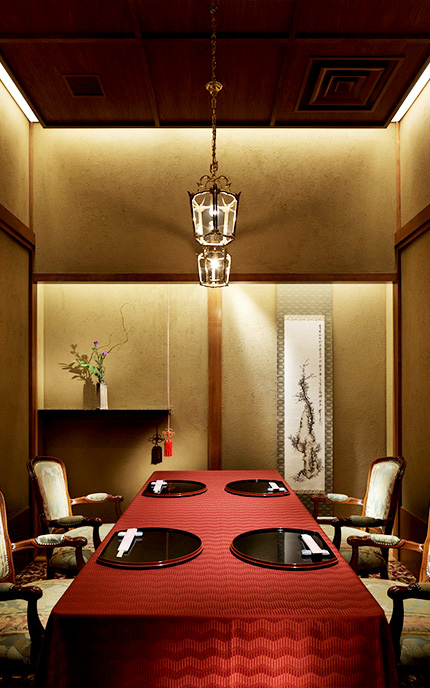
Keigetsu Room
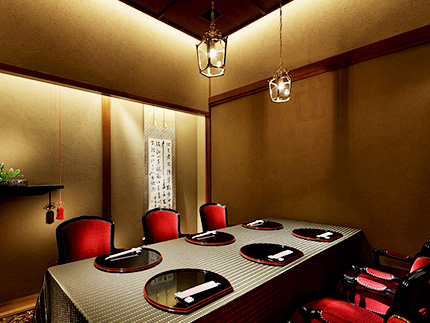
Kowa Room
Kowa Room
Keigetsu Room
These two refined Western-style private rooms reproduce the atmosphere of the early Meiji Era. The rooms represent the Sino-Japan Peace Memorial Hall and have exotic interiors blending the Japanese and Western styles.
The Kowa Room reproduces the hall where the Sino-Japanese Peace Treaty was concluded in 1895. Appreciate the history conveyed through the tablecloth, chair upholstery, lamps and other details in the room.
The Keigetsu Room was arranged after Matsubayashi Keigetsu, a Japanese painter from Hagi, Yamaguchi Prefecture. Guests can feel the atmosphere of Yamaguchi in this room, through details including a hanging scroll by Keigetsu, and a vase of Hagi ware, a specialty product of his hometown.
| Capacity | Kowa Room | 6 persons |
|---|---|---|
| Keigetsu Room | 4 persons |
| Type | Table seats |
|---|---|
| Room fee | 5,500 yen (Tax included) |
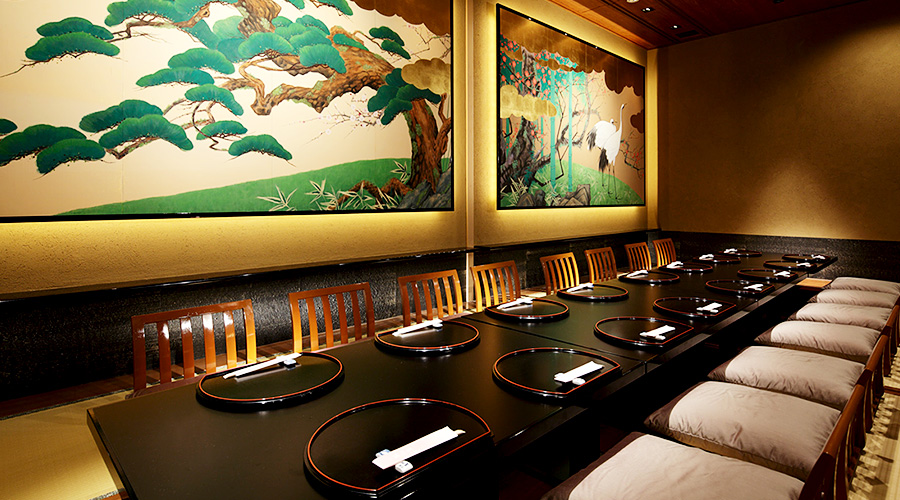
Shinsen Room
Shinsen Room /
Matsu Room / Tsuru Room
This is a spacious private room decorated with an impressive art panel that replicates a part of a folding screen painting that depicts natural beauties, drawn by Nishino Shinsen from Ube, Yamaguchi Prefecture, an apprentice of Matsubayashi Keigetsu. The entire room can be used as a banquet hall for up to 18 persons when the partitions are removed and is an ideal choice for a gorgeous banquet.
| Capacity | Shinsen Room | 18 persons |
|---|---|---|
| Matsu Room / Tsuru Room | 8 persons respectively | |
| Type | Sunken kotatsu | |
| Room fee | Entire room | 11,000 yen (Tax included) |
|---|---|---|
| Each partitioned room | 5,500 yen (Tax included) |
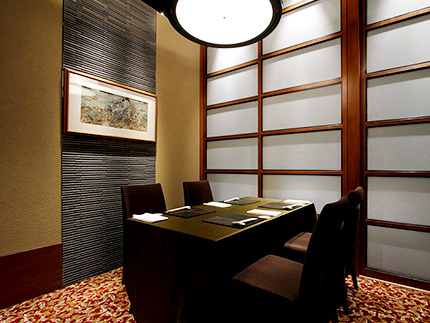
Manju Room
This private room is designed with a motif of Dannoura (Kanmon Straits), where the Minamoto clan and the Taira clan had their final battle. A painting of Taira Tomomori, drowning as he carried an anchor over his shoulders, is displayed.
| Capacity | 4 persons |
|---|---|
| Type | Table seats |
| Room fee | 3,300 yen (Tax included) |
|---|
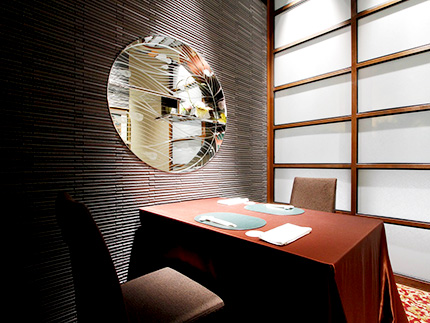
Kanju Room
This private room is designed with a motif of Dannoura (Kanmon Straits), where the Minamoto clan and the Taira clan had their final battle. A painting of Minamoto Yoshitsune jumping from boat to boat is displayed.
| Capacity | 2 persons |
|---|---|
| Type | Table seats |
| Room fee | 3,300 yen (Tax included) |
|---|
Casual seats
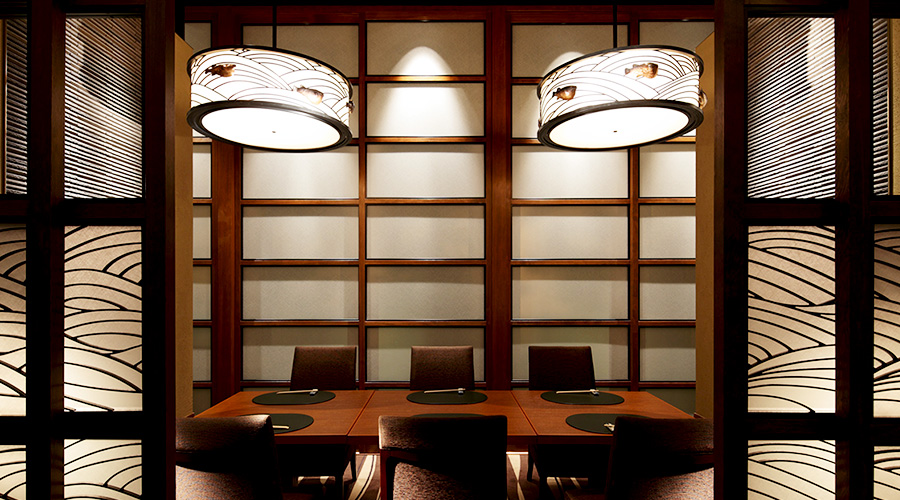
Casual zone
The interior design is filled with the attractive features of Shimonoseki with the fittings that use wave patterns as a motif of the Kanmon Straits, specially ordered pendants that are accentuated by fugu patterns, etc. The zone can also be used as semi-private rooms by small groups of guests.
| Capacity | 2 to 8 persons |
|---|
| Type | Table seats |
|---|
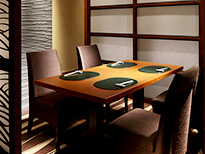
Four-person tables
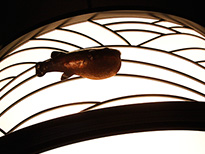
Pendants with fugu patterns
Other parts of interior
Letter written by Ito Hirobumi
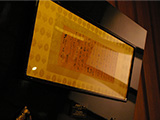
Over the main entrance is displayed a letter handwritten by Ito Hirobumi, the First Prime Minister of Japan, and godfather of Shunpanro. At the center of the text, guests can see the characters "Shunpanro," which are used as our company logo.
Calligraphy by Goto Shinpei
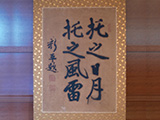
Goto Shinpei was the first president of the Manchuria Railway, and the seventh mayor of Tokyo City. This calligraphy was written when he visited the Shimonoseki main shop together with Ito Hirobumi.
Corridor imitating castle towns
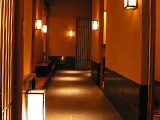
The corridor that connects to the private room area reproduces the stone pavement, earthen walls (mud and tile walls) and perpendicular corners that are seen in the castle towns of Hagi and Chofu in Yamaguchi Prefecture.
Large plate of Arita ware
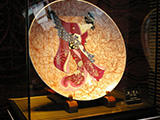
This large plate (ø45.45 cm) depicting a beautiful woman was made by Tsuji Ichido, who was regarded as the best painter in Arita, a town known for its pottery. It accompanied a large number of banquets as a supporting actress at the Shimonoseki main shop and is still attracting the eyes of guests in Tokyo.
Contact us to make a reservation
for the restaurant at:
- Service hours: 10:00–21:00
(excluding Sundays, and national holidays) - Reservation and inquiry via email would be highly appreciated.
Contact us to make a reservation
for the restaurant.




